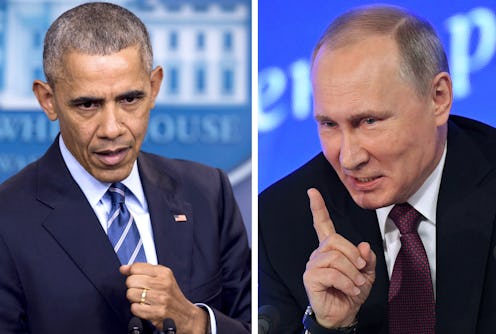News
Vladimir Putin's Response To Obama's Sanctions

After President Obama announced a series of retaliatory measures against Russia for interfering in U.S. elections on Thursday, Russian President Vladimir Putin did not counter with his own punishment. On Friday, Putin said he would not expel U.S. diplomats nor impose sanctions. “We won’t create problems for American diplomats,” he said in a statement, declining to mirror Obama's decision to expel 35 Russian diplomats, close two Russian compounds in Maryland and New York, and place sanctions on two Russian intelligence agencies, GRU and FSB.
However, Putin's statement went on to signal that he was refraining from punitive measures against the United States for an opportunity to work with President-elect Donald Trump and receive, perhaps, a warmer U.S. response. He said he would "plan further steps for restoring the Russian-American relationship based on the policies enacted by the administration of President Donald Trump."
The president-elect offered a tepid response to the president's decision to levy punitive measures against Russia. "It's time for our country to move on to bigger and better things," he said in a statement released by his transition team. Yet, Trump also seemed to signal that he would be more open to taking the Russian election hacking concerns more seriously, adding, "Nevertheless, in the interest of our country and its great people, I will meet with leaders of the intelligence community next week in order to be updated on the facts of this situation."
Although Russia has vehemently denied the accusations of election tampering, the FBI and the CIA have backed the assessment that Russia interfered with the 2016 election and did so, at least in part, to help Trump win. Trump, though, has largely dismissed this analysis. Earlier this month, Trump tweeted, "If Russia, or some other entity, was hacking, why did the White House wait so long to act? Why did they only complain after Hillary lost?"
In fact, the Obama administration accused Russia of tampering with the election in early October.
How the United States responds to Russia in 2017 may be a divisive topic for Republicans under Trump. Many top Republicans have already called for further probes and harsher measures against Russia in the face of reports that the country was involved with tampering with the U.S. election. Arizona Sen. John McCain said Russia hacking could "destroy democracy." He and fellow Republican, Sen. Lindsey Graham, released a joint statement on Obama's sanctions, declaring they would lead an effort to impose harsher ones:
The retaliatory measures announced by the Obama Administration today are long overdue. But ultimately, they are a small price for Russia to pay for its brazen attack on American democracy. We intend to lead the effort in the new Congress to impose stronger sanctions on Russia.
However, based on Trump's seemingly warmer feelings towards Putin's Russia, McCain and Graham's potential plan could have trouble coming to fruition in 2017.